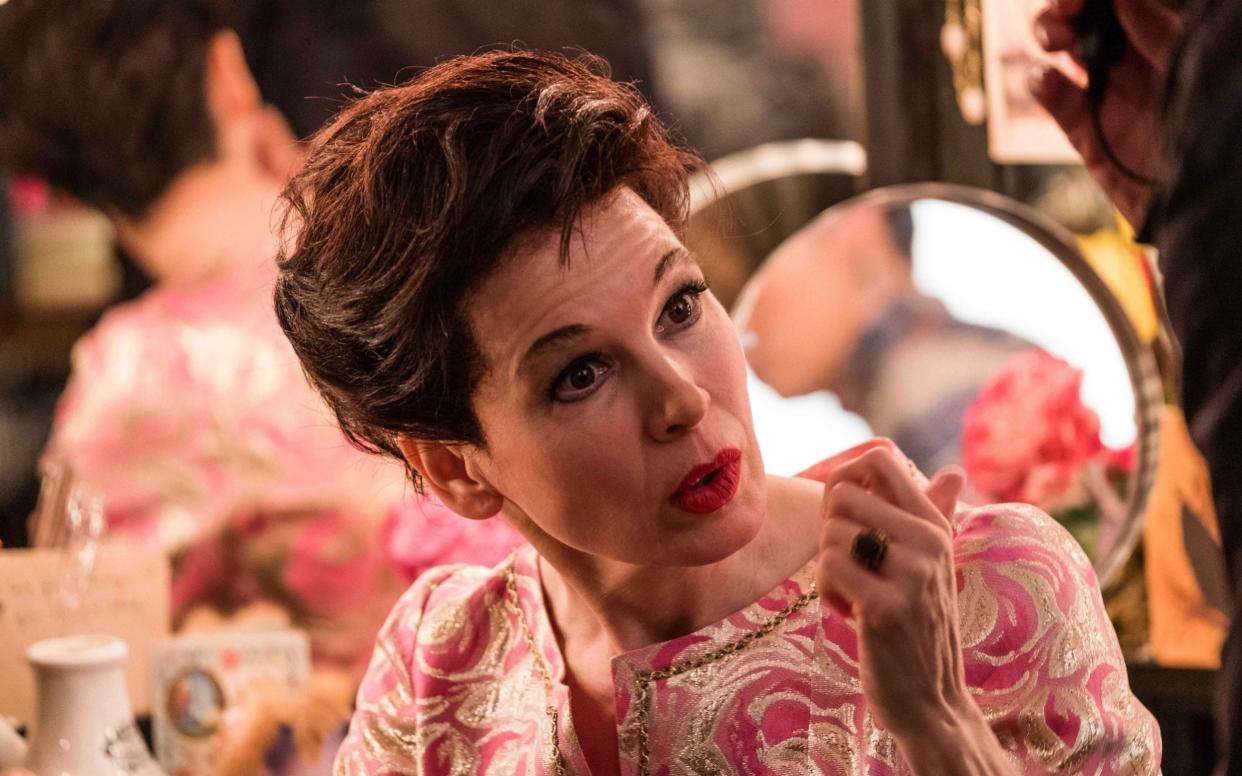Judy review: a dreamlike portrait of Garland on the rocks – but is it too prurient for comfort?

Dir: Rupert Goold. Cast: Renée Zellweger, Jessie Buckley, Rufus Sewell, Michael Gambon, Bella Ramsey, Finn Wittrock, Andy Nyman, Fenella Woolgar, Lucy Russell, Gemma-Leah Devereux, Royce Pierreson. 12A cert, 118 min
Judy Garland was 14 years old when her battle with diet pills started. She had no say in the matter. As Judy begins, she’s at the receiving end of a stern dressing-down on the Wizard of Oz set from Louis B Mayer (Richard Cordery) – the would-be avuncular mogul who called her “my little hunchback” and was grooming her to be MGM’s new sensation. What he needed from her was – chillingly – discipline. And when MGM threw her a staged birthday party to control her adorable image in the press, she was forbidden at all costs to eat any cake.
Fast-forward 30 years to the final months of Garland’s life in 1968, when she was ravaged, rake-thin, bankrupt and adrift in an alcoholic haze. It’s this Judy that Renée Zellweger embodies, if “embodies” is quite the word for this spectral, rasping, self-pitying figure.
Staging a comeback of her own, Zellweger rises smartly to the occasion. Perhaps there’s a few too many of those tight little Bridget Jones moues she’s fond of, rather than Garland’s open-mouthed, throaty lushness, but her particular stamp on this role makes more and more sense as the film goes on.
Rupert Goold’s film skips Garland’s glory years almost altogether – the public adulation in between, the glorious screen partnerships with Gene Kelly, Fred Astaire and so on. Desperate for money after the implosion of her marriage to Sid Luft (Rufus Sewell), Garland barely had a roof over her head. So the idea was hatched for a comeback tour, playing a series of dates in the city that had always received her with open arms: London.
Her last husband, the musician Mickey Deans (Fitt Wittrock), took over Luft’s job of trying his best to promote her, but her erratic, addled behaviour and helpless drug-use made her practically unemployable. Performances at the London Palladium were curtailed, or cancelled outright, when she arrived slurring or out of it. An assistant called Rosalyn Wilder, played by a prim, stressed Jessie Buckley, had to wrangle her out of bathrooms or whisk away libations for the length of the residency.
These sideshow relationships don’t go deep enough in Judy to give us the meat of a great biopic. This script aims to sketch Garland’s life with compassion, but it zooms in on the car-crash years with a tabloidy zeal that’s faintly unseemly, and Goold hasn’t directed the supporting cast to seem much more than helpless, oblivious, or at the end of their tether.
The bond that comes good, by default, is the imperishable one between Judy and her audience. She survives hecklings at the Palladium and gives as good as she gets. And she treats fans to a grand surprise, like an abrupt un-cancellation of one night’s appearance, when she feels up to it.
There’s a touching reciprocity in the film’s fictionalised elements. A gay couple waiting at the stage door invite Judy into their home for supper one night – astonished that she has no one else for company. Andy Nyman and Daniel Cerqueira bring such warmth to these made-up characters, with their failed omelettes and teary singalongs, that you could spend the whole film tripping over the memorabilia in their tiny Soho flat.
So effective are these scenes that you could come away from the film assuming the star had no friends in London at all, even though she’d visited and partied there on many occasions. The film’s cooked-up belief in her tragic solitude is myth-making for a gay icon.
Still, it’s a myth that’s quite hard to resist. When she pipes up with Over the Rainbow and falters halfway, the sequence becomes a communion between Judy and anyone her talent ever touched. And Zellweger, with her valiant singing, seems to be in on this process: of course she can’t reach the soaring notes Garland did, because even Garland was physically stymied at this point.
An encore for her faded stardom isn’t quite the point: sketchy it may be, but the film finds dreamy consolation in the final curtain.
Subscriber reward: Click here to save up to 40% on tickets at more than 250 cinemas across the UK
